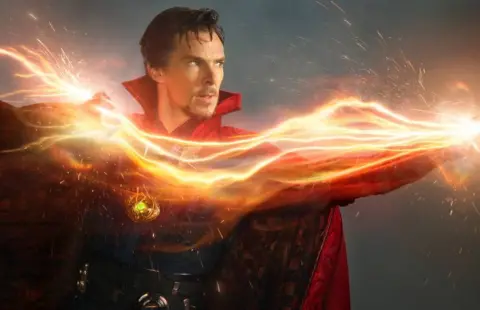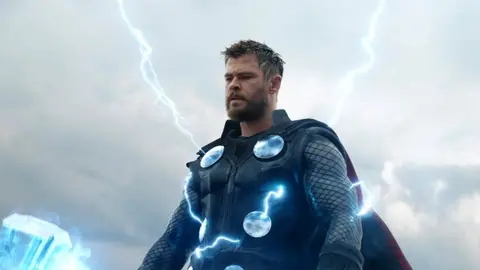Hollywood censors films to appease China, report suggests
 Marvel
MarvelHollywood bosses have been censoring films to placate the film market in China, a report has suggested.
The lengthy report says US film companies want to avoid losing access to China's lucrative box office market.
It said casting, content, dialogue and plotlines were increasingly being tailored to appease censors in Beijing.
The report, compiled by the free speech charity PEN America, claimed China was therefore influencing movies released in cinemas around the world.
China holds the world's second largest box office market behind the US.
According to the Hollywood Reporter, American films earned $2.6bn (£2bn) in China last year, with Disney's Avengers finale, Endgame, making $614m (£466m).
 Disney
DisneyPEN is a non-profit organisation that campaigns on free speech and it sponsors the Pinter Prize for literature.
The report said that Marvel's 2016 superhero film Dr Strange whitewashed a major Tibetan character for fear of jeopardising the title's chances of success in China.
The forthcoming Top Gun sequel, Maverick, was also criticised for the "mysterious disappearance of the Taiwanese flag" in a 2019 trailer.
"Our biggest concern is that Hollywood is increasingly normalising pre-emptive self-censorship in anticipation of what the Beijing censor is looking for," said James Tager, author of the report.
'Setting a standard'
The report said studios were self-censoring to ensure favourable treatment from the Chinese government, which could, in turn, lead to better release dates and preferential advertising arrangements.
It suggested that Hollywood is "often gleefully willing to speak truth to American political power" yet it takes the opposite approach to the Chinese government.
 Getty Images
Getty Images"In effect, Hollywood's approach to acceding to Chinese dictates is setting a standard for the rest of the world," the report stated.
Studios, it claimed, also invited Chinese government regulators on to film sets to advise "on how to avoid tripping the censors' wires".
In July, US attorney general William Barr criticised the film industry for being "all too willing to collaborate with the Chinese Communist Party".
Default version
However the report does mention the 2019 film Once Upon a Time in Hollywood, directed by Quentin Tarantino, which was "pulled from China's movie release schedule only a week before the film was slated to be released within the country, reportedly in response to the movie's insufficiently heroic depiction of Bruce Lee"
It said Tarantino "refused to recut the film to appease China's National Film Administration, nixing the movie's chances of a China release".
Screenwriter Howard Rodman, a former head of the Writers Guild of America, is quoted in the report as saying: "When the story of a director refusing to participate is newsworthy, you know that this is a pervasive phenomenon."
The 94-page document, titled Made in Hollywood, Censored by Beijing: The US Film Industry and Chinese Government Influence, called for transparency around film censoring.
It also recommended that Hollywood studios should insist that any version of a film adapted for the Chinese market does not become the default version issued for global release.
"Filmmakers cannot reduce their work to the lowest common denominator of only content that is deemed acceptable by one of the world's most censorious regimes," the report stated.
Such changes, the report concluded, "would be a powerful step toward shoring up Hollywood's commitment to freedom of expression in the face of this growing dynamic of censorship and propagandistic government influence".

Follow us on Facebook, or on Twitter @BBCNewsEnts. If you have a story suggestion email [email protected].
